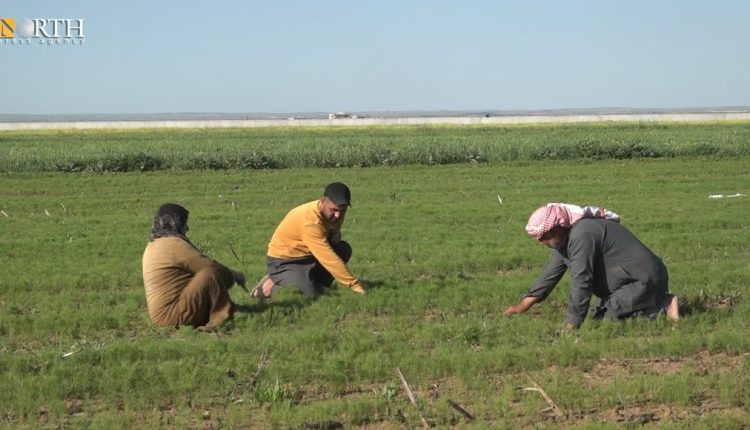
By Fattah Issa
KOBANI, Syria (North Press) – Habash Ismael, a 22-year-old farmer from the village of Alishar near the Turkish border in the eastern countryside of Kobani, northern Syria, is compelled to cultivate most of his land without irrigation, as he cannot develop his farming methods due to constant Turkish threats.
Due to the high cost of irrigated farming and continuous Turkish threats against Northeast Syria, Ismael is forced to rely on rainfall to cultivate most of his land.
He owns about 15 hectares of agricultural land near the Turkish border. Ismael irrigates five hectares using his neighbors’ wells, while the remaining 10 hectares rely on rainwater for crops like grass pea, cumin, lentils, and broad bean.
Ismael cannot currently afford to dig his own well due to the Turkish threats and attacks. However, he emphasized that if the region was stable, he would consider borrowing money to dig and equip a well. This would allow him to irrigate his land instead of relying solely on rainfall, which would enable him to repay his debts during the harvest season.
Farmers in the area are concerned about the lack of political stability and the occasional Turkish threats, which hinder the development of cultivation.
Stability develops farming
Ismael says digging and equipping an artesian well costs about $10,000. He points out that relying on a well in irrigation could potentially result in significant profits, enabling him to repay his debts by the end of the season. However, the presence of Turkish threats and ongoing instability in the area have heightened the concerns of the farmers.
Nihad Muhammad Hesso, 37, a farmer from the village of Alishar, faces challenges because of the Turkish threats even though he has a well.
Hesso wants to install solar panels to operate a pump that extracts groundwater to irrigate his land and use modern farming techniques. However, he cannot afford it now because of the high costs and the ongoing Turkish threats. He plans to pursue these improvements once the area becomes stable.
He owns about three acres of agricultural land, which is located just 500 meters away from the Turkish border. This year, he started using fuel-powered pumps.
Hesso indicates that he borrowed half of the required amount of money for the expenses despite his concerns about Turkish threats and the potential accumulation of debts if his land is attacked.
Hesso believes that if the Turkish threats stop and political stability is established in the region, farmers would be motivated to cultivate their lands multiple times a year. They could plant seasonal vegetables in addition to the cultivation of wheat. They could also enhance their farming methods by using solar-powered pumps, considering the scarcity and high cost of fuel.
Stability improves farmers’ situation
Hesso suggests that achieving stability and ending Turkish attacks will improve the farmers’ situation.
He indicates that the concerns of the farmers in his village seems too great as their lands are only 500 meters away from the Turkish border.
The farmer mentions that the concerns are raised during the harvesting season because any shots fired by Turkey may result in crop fires and lead to their financial ruin.
Meanwhile, Anwar Muhammad Hussein, a farmer from the border village of Mazra’at Dawoud, east of Kobani, said that many farmers, in addition to their agricultural activities, want to establish specialized farms for livestock and poultry in their village. However, they are postponing these plans until there is political stability in the region and the threats from Turkey subside.
Hussein adds that the distance between his land and the Turkish border does not exceed one kilometer. He owns four hectares of agricultural land and has leased an additional three others. He has cultivated two hectares with broad bean and the remaining with wheat.
Threats impede progress
Hussein says that, as farmers, they need and want stability to develop their agriculture through the installation of solar panels, livestock farms, and diversified crop cultivation. Unfortunately, their fears of Turkish attacks are hindering any progress.
He emphasizes that the primary obstacle to agricultural growth in the area is the presence of the Turkish threats and overall instability. He highlights that 90 percent of the local population depends on farming for their livelihood.
The farmer concludes that improving agriculture in the region and introducing modern farming methods will not only create job opportunities for the impoverished but also reduce the risks associated with dangerous illegal sea migration.
